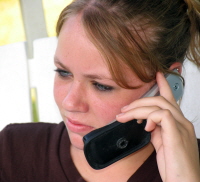 Breast tenderness or pain, also called mastalgia, can have several different causes. Some of them are rather benign while others require immediate attention by your gynecologist or primary care physician. Most women recognize that pain or tenderness in the breast can mean that something is wrong, and often jump to the conclusion that it must be cancer. And, while cancer may cause some degree of pain, it is rarely a primary symptom of the disease.
Breast tenderness or pain, also called mastalgia, can have several different causes. Some of them are rather benign while others require immediate attention by your gynecologist or primary care physician. Most women recognize that pain or tenderness in the breast can mean that something is wrong, and often jump to the conclusion that it must be cancer. And, while cancer may cause some degree of pain, it is rarely a primary symptom of the disease.
The causes of breast tenderness can be varied. The first are often categorized as cyclical, or related to the hormonal cycle which women experience every month. Breast tissue is stimulated by the estrogen and progesterone surges which occur in the second half of the cycle and often cause them to become lumpy and tender and sometimes to swell. When the uterus sloughs off its lining the breast tissue will also reabsorbed the extra fluid. (1)
When women go through menopause their hormone balance can be poor and cause swelling of the tissue in the breast. This added fluid causes tenderness and sometimes pain. Some women can also identify when they are ovulating by the additional sensations in their breast and nipple tissue.
Some medications can also cause a woman’s breast tissue to swell and cause tenderness and pain. High dose birth control pills is one example. Stress can also increase a hormonal imbalance in the body and cause breast tenderness and pain. (2)
Women who suffer from fibrocystic breast changes will find that their breasts become more tender pre-menstrually than they did prior to the development of the fibrocystic changes. Women who drink or eat a lot of caffeine will find that when they reduce the amount of caffeine take in each day they will also experience tenderness from any other underlying medical condition from which they suffer.
Because the breast tissue also has lymphatic fluid, and is so closely tied to the lymph nodes underneath the arms, some women can find an excess amount of lymphatic fluid to cause breast tenderness and pain. This can be alleviated by doing some simple exercises and wearing a supportive bra which is not restrictive. Some women who have large breasts are more comfortable in a bra which is more restrictive in order to reduce the motion while walking. However, this restriction also reduces the amount of lymphatic tissue and fluid which can be moved both in and out of the breast tissue, causing swelling and tenderness.
Some women may develop breast cysts, which is a separate condition from fibrocystic breast changes. These cysts, when they grow to a larger proportions, such as one to 2 inches, can cause breast pain and tenderness as they press on the surrounding tissue. (3)
Breast tenderness can also be a sign of early pregnancy and can begin as early as one to two weeks after conception. The cause of this tenderness and swelling is from the added amounts of hormones in the body as the baby is implanting in the uterus.
Cyclic breast pain can be made worse by some of the foods that we eat and drink, such as the caffeine mentioned earlier. Other recent research has indicated that animal fat can also contribute to breast pain. This may have to do with the animal hormones or with hormones they were given teat. For some women dairy products can also have the same results. (4)
Women who choose to use estrogen, progesterone or a combination of hormone replacement therapy may also find that these medications will increase tenderness in the breast. Some psychiatric medications or antidepressants can also cause breast pain, and even some cholesterol-lowering at heart medications can have the same results.
Treatments for breast tenderness will depend upon the causative factors and agents. For instance, if you are taking a high dose birth control pill your physician can investigate other alternatives which will give you the same results without the added hormones. Women who suffer from cyclical breast tenderness will find that it decreases when they change their diet, increase exercise and removes any other medications which may be interfering.
References
(1) Wexner Medical Center: Mastalgia
(2) Columbia Health: Does Taking the Pill Increase the Size of Your Breasts?
http://goaskalice.columbia.edu/does-taking-pill-increase-size-your-breasts
(3) MayoClinic.com: Breast Cysts
http://www.mayoclinic.com/health/breast-cysts/DS01071
(4) Obstetrics and Gynecology Clinics of North America: Mastodynia

Recent Comments